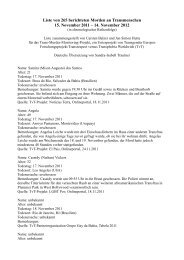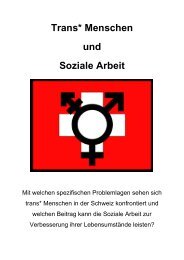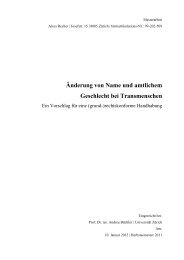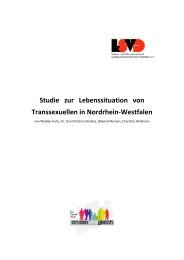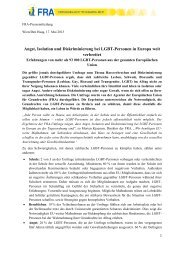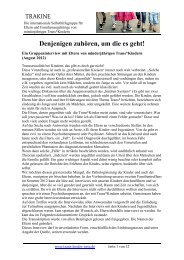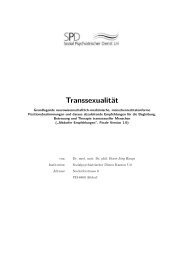Transgender Europe - Transgender Network Switzerland
Transgender Europe - Transgender Network Switzerland
Transgender Europe - Transgender Network Switzerland
You also want an ePaper? Increase the reach of your titles
YUMPU automatically turns print PDFs into web optimized ePapers that Google loves.
tgeu • activity report 10-12<br />
Policy Highlights<br />
There have been some significant<br />
developments in relation to the advancement<br />
of trans people’s rights at the<br />
<strong>Europe</strong>an, national and international levels<br />
in terms of both policy and legislation<br />
since the Council in Malmö in 2010.<br />
Within the <strong>Europe</strong>an<br />
Union, a trans-inclusive<br />
amendment to the EU<br />
asylum directive was<br />
passed by the <strong>Europe</strong>an Parliament on<br />
October 27, 2011. The qualification directive<br />
is the first EU law that explicitly<br />
mentions gender identity and defines<br />
fear of prosecution on grounds of gender<br />
identity as a legitimate reason for an<br />
asylum claim. Furthermore, the <strong>Europe</strong>an<br />
Parliament endorsed in July 2011 the<br />
UN Declaration on Sexual Orientation and<br />
Gender Identity, thus being the first EU<br />
body to demand the depathologization<br />
of trans identities. In December 2011, the<br />
EU Commission brought forward a draft<br />
of the so-called victims-rights package,<br />
which aims to better protect and support<br />
victims and witnesses of violence. The<br />
new law would explicitly recognize that<br />
gender, gender identity and the gender<br />
expression of a victim might prompt specific<br />
measures. Finally, the EU Commission<br />
has published the long-awaited thematic<br />
report on Trans and Intersex People,<br />
which will be the starting point for the<br />
Commission’s future work in the field. For<br />
the end of the year, we are also expecting<br />
results of the first Eurobarometer assess-<br />
ing attitudes in the EU towards minority<br />
groups inclusive of trans people. The EU<br />
Fundamental Rights Agency had already<br />
laid important factual groundwork with<br />
its report on Homophobia, Transphobia<br />
and Discrimination on Grounds of Sexual<br />
Orientation and Gender Identity in the<br />
EU Member States in November 2010. Its<br />
study on LGBT violence and discrimination,<br />
with results expected in the spring<br />
of 2013, is again a crucial driver for further<br />
LGBT legislative initiatives in the EU.<br />
The Council of <strong>Europe</strong>’s<br />
Commissioner for Human<br />
Rights launched<br />
a report on the situation<br />
of LGBT people in Council of <strong>Europe</strong><br />
member states in June 2011. This report<br />
is the first to assess the legal and social<br />
situation of trans people in all CoE member<br />
states. Together with the recommendations<br />
of the Committee of Ministers on<br />
measures to combat discrimination on<br />
grounds of sexual orientation and gender<br />
identity (CoM Rec 2010 (5)), it is a<br />
key tool for trans advocacy. TGEU is part<br />
of a monitoring project by ILGA-<strong>Europe</strong><br />
in which member states are assessed<br />
in relation to their actions to implement<br />
the recommendations. The focus is on<br />
countries in Eastern and South-Eastern<br />
<strong>Europe</strong>. Moreover, the CoE has launched<br />
an LGBT pilot project on the implementation<br />
of the recommendations together<br />
with six member states.<br />
On November 30 2011, the <strong>Europe</strong>an<br />
Court for Human Rights established<br />
‘transsexualism’ as a stand-alone ground<br />
for discrimination under the Anti-discrimination<br />
Paragraph 14 of the <strong>Europe</strong>an<br />
Convention on Human Rights. While<br />
the language used may still sound clumsy,<br />
its intention is clearly to establish<br />
that trans people are explicitly protected<br />
against discrimination.<br />
On the national level, legal gender recognition<br />
is advancing in several <strong>Europe</strong>an<br />
states. Iceland and Portugal have already<br />
seen new legal regulations or revisions<br />
of existing ones. In Austria and Germany,<br />
high-level court decisions ended sterilization<br />
and divorce requirements in national<br />
legislation. When it was introduced<br />
in March 2011, the Portuguese law was<br />
hailed as the most progressive to date.<br />
The introduction of the Argentinean Gender<br />
Identity Bill in summer 2012, the first<br />
law worldwide to fully respect each individual’s<br />
gender identity and guarantee<br />
coverage of costs for trans-related health<br />
care, set new standards. It is certainly<br />
affecting current and future debates in<br />
those <strong>Europe</strong>an countries that are reviewing<br />
gender-recognition legislation or<br />
in which activists are pushing for such<br />
legislation. Among these countries are<br />
Austria, Belgium, Finland, Ireland, Italy,<br />
Germany, France, Malta, Moldova, Montenegro,<br />
the Netherlands, Poland, Serbia,<br />
Sweden and the Ukraine. The Netherlands<br />
announced legislation that would<br />
make it the first country in <strong>Europe</strong> to<br />
forego the diagnosis requirement. Unfortunately,<br />
Ireland has not lived up to expectations<br />
to introduce legal gender recognition<br />
legislation: the governmental<br />
working group still advises for a divorce<br />
requirement and there is little to no progress<br />
in the whole process. The Swedish<br />
government was forced by a wave<br />
of national and international pressure to<br />
review its refusal to remove the sterilisation<br />
requirement in its legislative reform.<br />
A recent review in the Czech Republic did<br />
not involve consultation with the trans<br />
community and resulted in increased<br />
barriers for those wanting to change<br />
documents. Even so, medical-dominated<br />
discourses on civil-status documents<br />
are on the way out, with human-rights<br />
concerns being the increasingly accepted<br />
criteria for gender-recognition legislation.<br />
On the international<br />
level, on June 17 2011,<br />
the UN Human Rights<br />
Council passed the first<br />
ever resolution on Sexual Orientation and<br />
Gender Identity. The resolution recognized<br />
the systematic human-rights violations<br />
to which LGBT people are subjected<br />
worldwide and requested the High Commissioner<br />
for Human Rights to prepare a<br />
study on this subject. The High Commissioner’s<br />
report, the first of its kind, was<br />
published in December 2011 and cites<br />
the research results of TGEU’s TvT project,<br />
which illustrates the gravity and extent<br />
of discrimination and violence faced by<br />
trans people.<br />
12<br />
13



